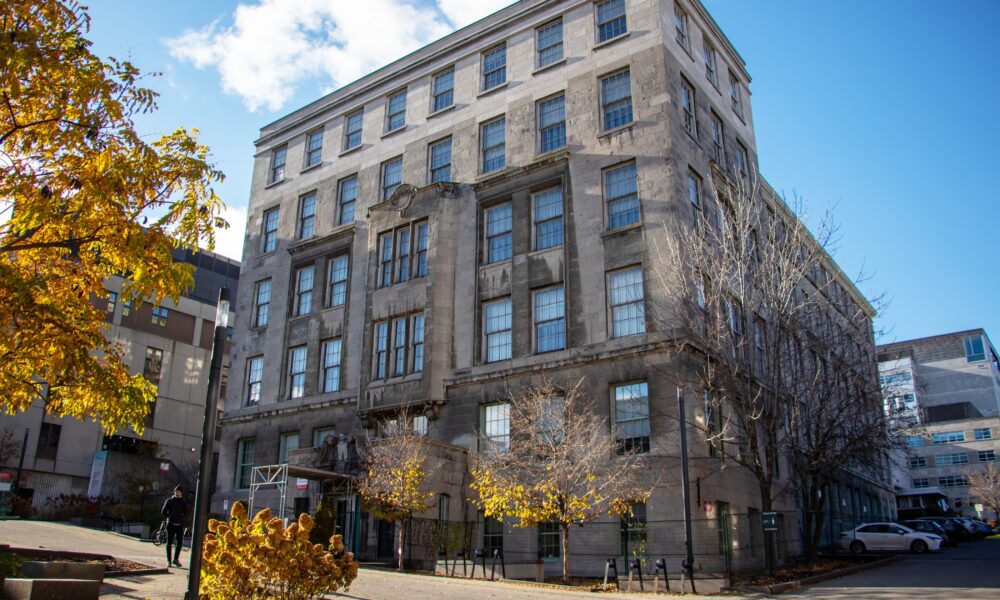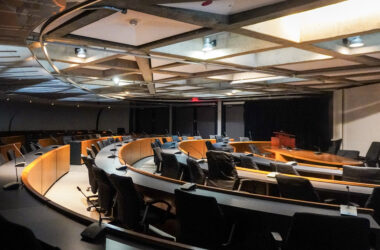At a Board of Governors (BoG) meeting on Dec. 12, The Committee on Sustainability and Social Responsibility (CSSR) presented a report that did not recommend that McGill should divest from companies with financial ties to the Israeli state.
CSSR Chair Alan Desnoyers presented the report to BoG, which the committee compiled in response to an expression of concern (EoC) that the Secretariat received on June 25. This EoC demanded that the university divest from companies complicit in the genocide in Palestine, which they claimed constitutes social injury.
Desnoyers explained to the BoG that the committee did not recommend divestment because it did not find that such companies caused social injury. According to the CSSR’s terms of reference, social injury refers to “the grave injurious impact” of a person’s activities on others or the environment. As Desnoyers noted, the terms of reference state that a person will not be deemed responsible for social injury for doing business with those who directly cause it. Under these terms, the committee found that private entities with financial ties to the Israeli military do not necessarily cause social injury.
In response to a question on the university’s plan for sharing this information with staff and students, Vice-President (Communications and Institutional Relations) Philippe Gervais explained that McGill was planning on sending communications to the McGill community in the coming days. Gervais noted that many students, including those who would have otherwise protested in response to McGill’s decision, will be busy studying for exams or will be out of town for the holidays.
“We’re planning on […] a quiet communication to the community,” Gervais said. “We’re not hiding from it, but we’re not promoting it widely.”
Desnoyers went on to note that the CSSR is also working on a report in accordance with their mandate to evaluate “the question of divestment from direct investments in companies that derive a dominant portion of their direct revenues from the production of military weapons regardless of the countries in which they operate.” McGill committed to considering divestment from weapons manufacturers on June 18, during negotiations with representatives to the Palestine Solidarity Encampment. The CSSR expects to table their report on this item at the next BoG meeting on Feb. 6.
Desnoyers also shared the CSSR’s recommendation to the BoG that it endorses the 2025-2030 Climate and Sustainability Strategy. This strategy will follow the 2020-2025 strategy, and seeks to enhance McGill’s environmental commitments and sustainability. It is focused on improving four areas: learning and research, physical environment, resource management, and community building. In addition to existing long-term commitments—such as reaching carbon neutrality by 2040—the 2025-2030 strategy includes new commitments to “increase climate resilience” and “become a nature positive university.”
Provost and Executive Vice-Principal (Academic) Christopher Manfredi also gave a presentation on behalf of the Finances and Infrastructure committee to the BoG. Manfredi explained that the committee recommends a final fiscal year (FY) 2025 budget with a deficit of $15 million CAD, with a $5 million CAD contingent. Due to a number of changes in funding—including tuition hikes for out-of-province students—budget projections predict that the deficit will reach $44 million CAD by FY2026.
Manfredi also presented financial plans for FY2026, and estimated that McGill will need to make roughly $45 billion CAD in budgetary corrections during that year to have a balanced budget. Proposed methods of addressing this deficit in FY2026 include increasing tuition for out-of-province students in professional programs, reducing staff, and lowering the amount of the operating budget going toward student aid.
Another topic discussed at the meeting was the potential impacts of the provincial government’s adoption of Bill 74. This bill grants education ministers greater power in restricting the number of international students post-secondary institutions take in. In his opening remarks, McGill Vice-Chancellor and President Deep Saini stressed that capping international student numbers would diminish the rich perspectives of international students in classrooms, violate the academic freedom and autonomy of universities, and threaten the research sector—which relies heavily on international students.
“In my view, […] this legislation poses an enormous risk to Quebec’s future,” Saini said. “[International students] enrich the nature of discourse in classrooms [and] bring talent that is not locally available.”
Moment of the meeting
Saini explained that the government will likely announce a scenario for restrictions on international students in January 2025. One potential scenario would see international student intake capped at the number who entered in Fall 2024. Saini emphasized the harmful effects of such a limit, and noted that McGill and other Quebec universities are collaborating to present alternative scenarios to the provincial government.
Soundbite
“It’s a question of reprioritizing as we reprioritize everything […] to realign our expenses to what we can afford to make sure these important points do not get dropped [….] We’re not talking about humongous investments that are going to change the face of the budget.”— Vice-President (Administration and Finance) Fabrice Labeau responding to a question on the impacts of the Climate and Sustainability Strategy 2025-2030 on McGill’s finances. Labeau expressed that he was optimistic about the plan, stressing that many of the projects it outlines entail relatively small expenses for the university.








